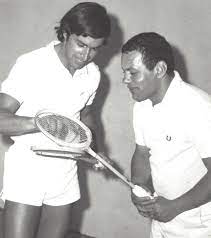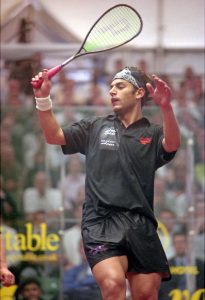In recent years, Egypt has become a dominant force in Squash with success across the major tournaments, if you wondered why? It is down to a number of factors that have made Squash one of the country’s most popular sports.

Nour El Sherbini and Ali Farag – Winners of British Open 2023 (credit: PSA World Tour)
As we all know, the game is believed to have originated in England in the 19th century, but Squash players from Egypt have turned it into a national passion.
Here’s the story of how Squash became a global force in the sport.
British influence
The sport’s popularity in Egypt began in the 1930s when British soldiers introduced the game to the country. The first squash courts were built in Cairo, and the game quickly caught on with the Egyptian elite.
The country’s first national squash championship was held in 1938, and the game continued to gain popularity throughout the 1940s and 1950s.
The turning point for squash in Egypt came in the 1960s when two Egyptian players, Abdel-Fattah Abou-Taleb and Mahmoud Karim, began to dominate the international squash scene.

Abdel-Fattah Abou-Taleb (right) with Jonah Barrington GB (left)
Much later both Abou-Taleb and Karim won numerous titles, and their success inspired a new generation of young Egyptian players to take up the sport.
Emergence of the first Egyptian world-class player
In the 1990s, another Egyptian player, Ahmed Barada, emerged as a world-class player and became the first Egyptian to win the World Junior Squash Championship. Barada’s success further fueled the popularity of squash in Egypt, and the country began to produce a steady stream of world-class players.

Ahmed Barada (credit Squash Site)
As a result, the Egyptian government has also invested heavily in the sport, building state-of-the-art facilities and providing support for young players.
In addition to its success on the international stage, squash has also become a popular recreational activity in Egypt, with squash courts found in clubs and gyms throughout the country. The game’s popularity is also reflected in Egyptian culture, with references to squash appearing in literature, films, and even pop songs.
Grassroots Squash in Egypt

Black Ball Sporting Club (credit: Facebook)
Squash has become an integral part of Egyptian culture, and the sport is played at all levels, from amateur to professional. Grassroots squash in Egypt is well-supported, and there are numerous programs in place to encourage young players to take up the sport.
The Egyptian Squash Federation (ESF) oversees the development of squash in Egypt and has implemented various initiatives to promote grassroots participation. The federation runs a national program called “Squash in Schools,” which introduces the sport to young students across the country. The program provides training for teachers and coaches, and it has been successful in identifying and nurturing young talent.
In addition to the Squash in Schools program, the ESF also organizes national and regional tournaments for young players. These tournaments provide a platform for young players to showcase their skills and gain valuable experience. The ESF also provides financial support for promising young players, helping them with training expenses and tournament fees.
Egyptian clubs and sports centres also offer squash training programs for children and teenagers. These programs are designed to develop basic skills and techniques and to foster a love of the game. Many of these programs are run by former professional squash players who are passionate about developing the next generation of Egyptian champions.
Squash tournaments in Egypt

Credit: PSA World Squash
Egypt is known for hosting some of the most prestigious squash tournaments in the world. The country has a long history of producing world-class players and has a passionate fan base that fills the stands for major events.
Here are some of the most notable squash tournaments held in Egypt:
- PSA World Championships: This is the most prestigious tournament in professional squash, and it is often held in Egypt. The tournament brings together the top players from around the world and offers significant prize money. The venue for the PSA World Championships has changed over the years, but it has been held in Cairo, El Gouna, and Alexandria in recent years.
- Black Ball Open: This is a major tournament on the Professional Squash Association (PSA) World Tour and is held annually in Cairo. It attracts top players from around the world and offers significant prize money.
- Egyptian Open: known as CIB Egyptian Open is another major tournament on the PSA World Tour and is also held annually in Cairo. The tournament has been held since 1999 and attracts top players from around the world.
- Women’s World Championship: Egypt has hosted the Women’s World Championship several times, with the most recent event taking place in 2019 in front of a capacity crowd at the Great Pyramid of Giza. The tournament is held every two years and brings together the top female squash players from around the world.
- Men’s World Junior Championship: Egypt has also hosted the Men’s World Junior Championship several times, most recently in 2021. The tournament showcases the best young players in the world and is a breeding ground for future champions.
These tournaments, among others, have helped cement Egypt’s status as the global epicentre of squash.
Top Egyptian Squash players
Following the path made by Ahmed Barada, Egypt is now the dominant force in world squash, with their male and female squash players regularly winning major tournaments and dominating the top of the world rankings.

Ramy Ashour (Egypt) 2004/2006 Mens Champion (Image credit – World Squash)
Here are some of the most notable Egyptian squash players:
- Ramy Ashour: Considered one of the greatest squash players of all time; in a career spanning two decades, Ramy won three World Championships and four British Open titles during his career. He was known for his creative shot-making and innovative playing style.
- Mohamed El Shorbagy: Currently the top-ranked male squash player in the world, Mohamed El Shorbagy has won the World Championship twice, the British Open three times, and the US Open four times. He is known for his powerful, attacking style of play.
- Nour El Sherbini: The top-ranked female squash player in the world, Nour has won four World Championships and three British Open titles. She became the youngest-ever World Champion in 2015 at the age of 20.
- Nour El Tayeb: In 2018 Nour made history by becoming the first woman ever to win the prestigious Tournament of Champions. She has also won the US Open and the Hong Kong Open. Her husband, Ali Farag is also a major star and champion in Squash too.
- Karim Abdel Gawad: known for his deceptive and fluid playing style, he won the World Championship in 2016 and won several major tournaments, including the Tournament of Champions and the Egyptian Open.
- Raneem El Welily: like Nour El Sherbini, Raneem El Welily was also the world’s top-ranked female squash player in 2015 and won the World Championship in 2017. She retired from professional squash in 2020.

Manchester Open 2020 Winners: Mohamed ElShorbagy (L) and Nour El Tayeb (R) (Credit: Manchester Open 2020)
These players, among others, have helped Egypt dominate the sport of squash at the international level.
Final Thoughts
In all honesty, Egypt has a brilliant Squash setup, especially with their government backing to produce talent. Without being too political, if all countries supported their Squash initiatives who knows where their teams could be on the same level as Egypt.
Overall, it is good to see that grassroots squash in Egypt is well-supported, and there is a strong focus on developing young talent.
With the country’s rich history in the sport and its continued success at the professional level, it is likely that Egypt will remain a dominant force in squash for years to come.





